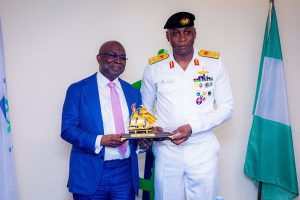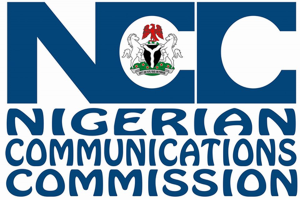…Why they are considered perfect fits for their assigned portfolios
Introduction
Nigerian political leaders do not take issues of loyalty and financial support by their followers lightly. This is because the leaders’ failure or success, electoral loss or victory depends on them. Therefore, the leaders descend heavily on disloyalty or betrayal and bountifully reward faithfulness, obedience and financial support whenever the occasion demands.
Bola Ahmed Tinubu, Nigeria’s President, former pro-democracy advocate, former Senator and former State Governor, is a typical example. When he was Lagos State Governor, Tinubu forced two of his Deputy Governors, Senator Kofor Bucknor- Aderele and Femi Pedro and whom he accused of disloyalty. Also, as the political leader of Lagos State and National leader of All Progressives Congress (APC), Tinubu blocked Akinwumi Ambode, one of the successors as Lagos State Governor, from getting a second term for alleged disloyalty.

Now, flip to the other side, the reward side. To say that Tinubu is exceedingly generous and committed to rewarding his loyal supporters is an understatement. Over his political career, Tinubu has groomed many of his loyalists and associates across the country, especially in his immediate constituencies of Lagos and Southwest, to occupy powerful offices at state and Federal levels, including governors, state and national legislators, ministers, Vice-President, special advisers and head of Federal agencies.
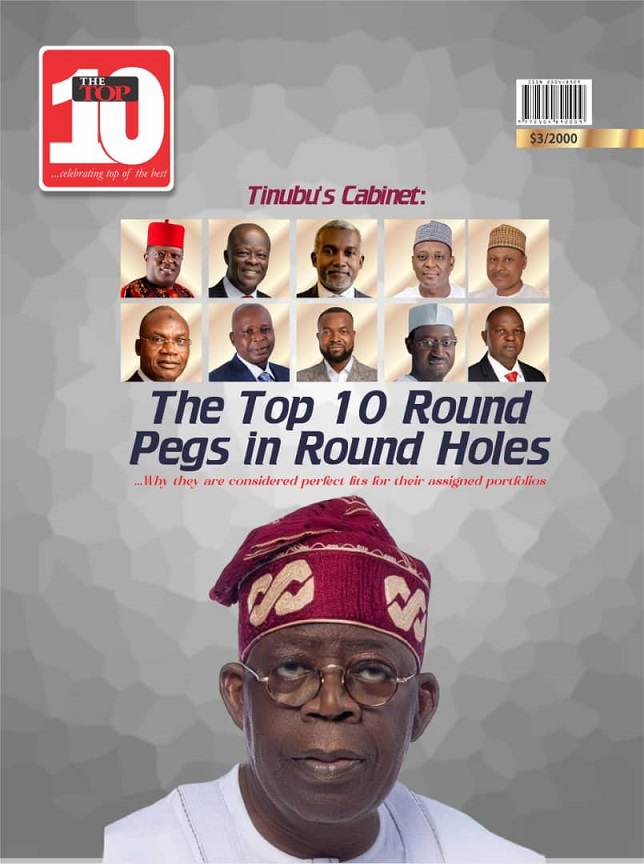
Tinubu is credited with singlehandedly installing his three consecutive successors till date as Lagos state Governor since he left office after serving two terms as the Governor of the state. They include, Babatunde Fashola, Akinwunmi Ambode and the incumbent, Babajide Sanwo-Olu.
Outside Lagos, some of Tinubu’s loyalists who were reportedly sponsored or assisted into powerful positions by Tinubu in the South West include Rauf Aregbesola, former Minister of Interior and former Governor of Osun State; Kayode Fayemi, former minister of Solid Mineral Resources and immediate past Governor of Ekiti State; former and present Governors of Ondo state, Olusegun Mimiko and Rotimi Akeredolu; as well as Abiola Ajimobi, late Governor of Oyo state.
But what is most distinctive and significant about Tinubu is that he does not fix his loyalists in positions just as a matter of patronage or ‘job for the boys.’ He has built a reputation for picking the most qualified, most experienced, most competent and most suitable of his loyalists for particular assignments. While some of his peers would argue that they are constrained by statutory requirements for balancing or even spreadin making government appointments, Tinubu appears to think otherwise. He seems to believe that Federal Character, as the requirement is called in the Nigerian constitution, is not inconsistent with merit-based appointments – that, in every state of the Federation, or every part of a State can be found a variety of qualified, exprienced, competent and suitable professionals for every assignment or appointment.
Thus, when Tinubu was elected President, many who were familiar with his manpower recruitment policy, watched out to see if his appointments, especially into his cabinet, would pass the test of his own reputation. We, at The Top10 Magazine, were among the watchers. We wanted to establish whether political considerations, reward for loyalty, hard work, and financial contributions would blur his cherished vision and knack for always putting round pegs in round holes.
When the appointments and assignment of portfolios were released, the Top10 magazine pushed the toothbrush through the profiles and antecedents of the ministers and matched them with the mandates of their ministries. We found, unsurprisingly, that a very large number of the ministers were perfect fits for their new offices. Significantly, we also found that some of them were not, strictly speaking, loyalists of the President. At least one, at the point of his appointment, had very strong links with Tinubu’s top presidential election challenger; another had made uncomplimentary public remarks about Tinubu just before his entry into the presidential race, while one is still a card-carrying chieftain of the Peoples Democratic Party (PDP), the first runner-up to Tinubu’s All Progressives Congress (APC) in the February 25, 2023 presidential election.

After a careful analysis of our findings, we arrived at the inevitable conclusion that the President put service delivery above other considerations in making most of his ministerial appointments: He went for those who could get the job done.
Unfortunately, our tradition of showcasing only those within the top 10 bracket of the area of our assessment would not permit us to feature all the ministers in the Tinubu cabinet who also are round pegs in round holes. By the time you read through the following pages, you will understand why the 10 we have selected stand out.
WALE EDUN – (Minister of Finance and Coordinating Minister for the Economy)
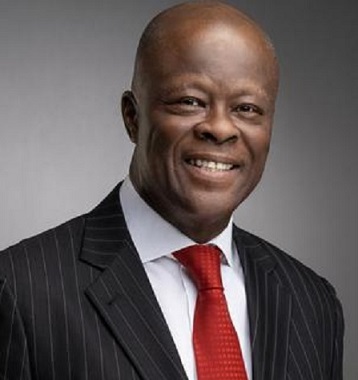
Olawale Edun’s appointment as a minister did not come as a surprise to followers of President Bola Tinubu. Less surprising still is Edun’s assignment as minister of finance and coordinating minister for the economy.
Long before Tinubu unveiled his ministerial nominees following his presidential election victory, informed speculations had tipped Edun for the appointment and posting. This is on account of Edun’s background in economics, public finance, international finance, merchant banking and corporate finance at both national and international levels. His long standing close working relationship with Tinubu, at official and unofficial levels, as his economic policy adviser was an icing on the cake.
Apart from being a classical example of putting a round peg in a round hole, Edu’s appointment is another proof of Tinubu’s reputation as a leader with a nose for matching professionals with commensurate responsibilities. He identifies go-getting young professionals, mentor and deploying them to tasks in which they produce outstanding results. Once they prove themselves, Tinubu keeps them around himself and helps move them to positions of higher responsibility.
That is the story of Wale Edun, the new minister of finance and coordinating minister for the economy.
In 1999, Governor Tinubu appointed Edun as his finance Commissioner in Lagos state where he became one of the most outstanding managers of the state’s finance and economy. Apparently in acknowledgement of his good works, Tinubu recommended Edun, alongside Yemi Cardoso and Yemi Osinbajo, to Muhammadu Buhari for appointment as running mate in 2015. The trio had worked as commissioners appointed by Tinubu when he was Lagos state Governor between 1999 and 2007. Buhari went for Osinbajo. Although Edun was, thereafter, said to be nominated by Tinubu for ministerial appointment by Buhari, the move did not sail through.
Since then, Edun has been performing serveral other adhoc tasks for Tinubu in the build-up to the latter’s presidency. He has been one of Tinubu’s closest advisers and a member of his economic team that helped prepare his election manifesto. He was nominated by Tinubu as a member of the Presidential Transition Council (PTC) after his declaration as winner of the 2023 presidential elections.
Edun’s appointment as minister in charge of finance and economy was, therefore, a seamless transition from being a personal adviser to the position of an official presidential pointman in the same field.
Before Edun was appointed minister, President Tinubu had introduced two of the boldest economic reforms that Nigeria has seen in years. They include scrapping of the popular but costly petrol subsidy and unification of the existing multiple exchange rates, weakening the Naira to record lows.
The reforms are designed to kick-start growth but inflation has soared, worsening Nigeria’s cost of living crisis and posing a big headache for Tinubu and his new ministers. Curing that headache and guiding the reforms towards achieving the intended outcomes are the new minister’s primary responsibility, among others.
Olawale Edun, popularly known as Wale Edun, holds a Bachelor’s degree in Economics from the University of London and a Master’s degree in Economics from the University of Sussex, England.
Edun had a tremendous career in the financial sector with over twenty-five years of experience in merchant banking, corporate finance, economics and international finance at national and international levels. He served as the Head of Treasury and Deputy Head of Corporate Finance at Chase Merchant Bank and he was in charge of the bank’s Treasury and Money Market activities with major responsibility for Capital Market and Financial Advisory operations on behalf of the local subsidiaries and affiliates of major multinational companies.
During his time at Chase, he gained international experience while on secondment to the Wall Street firms of Lehman Brothers and Chase Manhattan Capital Markets Corporation in New York, USA. From 1980 to 1986, he worked at Chase Merchant Bank (later Continental) in Lagos.
Edun joined the World Bank/IFC in Washington DC, US through the elite Young Professionals programme in September 1986. At the World Bank, he worked on economic and financial packages for several countries in Latin America and the Caribbean, including the Dominican Republic and Trinidad and Tobago as well as Indonesia and India in the Far East.
He has been the Chairman of Chapel Hill Denham Group since March 2008. In 1989, he returned to Nigeria as Co-Founder and Executive Director of Stanbic IBTC Plc (formerly Investment Banking & Trust Company Limited). In 1994, he founded Denham Management Limited. He also sits on the Board of a number of other companies. In 1999, he was appointed as Commissioner for Finance in Lagos State, a position he held for an unprecedented two terms under Governor Bola Ahmed Tinubu.
He is a director of several other private businesses; and Chairman of the Board of Trustees, Ogoni Trust Fund for the environmental Clean-up of Ogoniland in the Niger Delta of Nigeria.
Edun is also an International Trustee of the Duke of Edinburgh’s International Award Foundation and Chairman of Lagos Boxing Hall of Fame, a registered non-profit youth development organization that runs amateur boxing in Lagos in conjunction with the Lagos Amateur Boxing Association.
Edun has also been involved in several acts of Philanthropy. He is the Chairman of Livewell Initiative, a health sector Non-Governmental Organization (NGO) and a Trustee of Sisters Unite for Children, an NGO focused on helping children in need.
The finance minister is married to Amy Adwoa Edun (née Appiah) who is a Ghanian. One of his sons, Adetomiwa Edun, is an actor in the UK movie industry. Another, Tobi Edun, is married to Folake Fajemirokun, daughter of Chief Oladele Fajemirokun, successful business magnate, entrepreneur, investor, venture capitalist, philanthropist and Chairman of Xerox Company.
PROF. TERLUMUN UTSEV – (Minister of Water Resources and Sanitation)
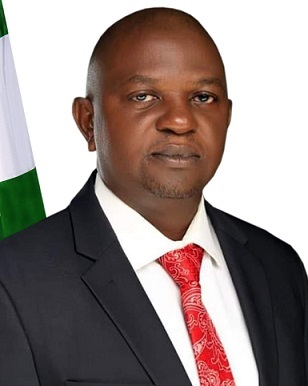
One of the most befitting ministerial appointments made by President Bola Ahmed Tinubu is that Prof. Joseph Terlumun Utsev, the Minister of Water Resources and Sanitation. His professional and career backgrounds make him a perfect fit for the job.
Prof. Utsev, a Civil and Water Engineer, academic, politician, philanthropist, entrepreneur, and administrator, was once a Commissioner for Water Resources and Environment in Benue state. He had also served as Director of Engineering at the Lower Benue River Basin Development Authority (LBRBDA). If you match these multi-faceted competences and experiences with the mandate and the challenges of the Ministry of Water Resources, you’ld see that President Tinubu was spot on in assigning the Water Resources portfolio to Prof. Utsev.
The core mandate of the ministry is to develop a framework towards making the Water sector a pillar for food security, job creation, water supply, sanitation and hydropower as well as mitigate water-induced disasters like erosion and flooding. The new minister, an academic of distinction, will naturally be at home with a working document of this nature: to repeal, adopt or adapt it to suit the realities on ground and his vision for the water sector.
It was Prof. Utsev’s contributions to the development of water resources and environmental engineering that earned him the appointment as the Commissioner of Water Resources and Environment in Benue State in 2017. In that position, he contributed immensely towards tackling the hitherto perenial water scarcity in Makurdi, the state capital, and other communities in the state. His involvement in the design and influence on the construction of the Idye Basin Phase II drainage also showcased his commitment to improving the state’s erosion control infrastructure. Now, as the minister of Water resources, he will definitely rely on this experience to deal with similar problems of flooding and erosion experienced in different parts of the country.
A few months before leaving office, Engr. Suleiman Adamu, the immediate past minister of Water resources, inaugurated a Presidential Steering Committee “to develop a comprehensive plan of action for the prevention of the recurrence of flood disasters in Nigeria.’’ Prof. Utsev has inherited the chairmanship of the Committee from where he would direct the Federal Government’s efforts in ameliorating the twin problems of flooding and erosion.
In the area of water supply, Prof. Utsev also fits into his new role seamlessly, coming from his earlier position as Water Resources Commissioner. Then, he was entrusted with responsibility for the water needs of Benue people. The new portfolio is like an expanded version of that assignment. The Federal Government, through his ministry, is responsible for policy, advisory and formulation, data collection, monitoring and reporting and making special intervention for the water supply needs of the entire country.
Even before his ministerial appointment, back in 2020, Prof. Utsev’s expertise had been acknowledged at the national level when President Muhammadu Buhari appointed him as the Executive Director of Engineering at the Lower Benue River Basin Development Authority (LBRBDA) in Makurdi. There, he played a key role in supervising the construction of various engineering projects, such as dams, bridges, roads, boreholes, and drainages.
For him, therefore, being made Minister of Water Resources, is like returning to a familiar terrain, albeit at a higher level with wider responsibilities. He is now in charge of not only an Engineering Directorate; in charge of not only LBRBDA, but also of all the 12 River Basin Development Authorities (RBDAs) in the country, and more. The over 408 dams located in various parts of the country, controlled by the RBDAs, with potential of 3.14 million Hectares (Ha) of irrigation land, are also under his supervision. Prof. Utsev who was awarded the Best Honourable Commissioner in the Water/Environmental sector in Nigeria by Independent Assessors in 2018, can be trusted to rise to the occasion.
Professor Utsev’s background in entrepreneural education and administration will also come in handy for him in taking irrigation management in Nigeria to a new level. The new minister had served as the Deputy Director and later as a full Director in the Centre for Entrepreneurship Development at the Federal University of Agriculture, Makurdi, (now Joseph Sarwuan Tarka University, JOSTUM) from 2013 to 2017. During this time, he spearheaded the establishment of seven workshops, enhancing students’ entrepreneurial skills and generating Internally Generated Revenue (IGR) for the institution. The new policy thrust of irrigation farming in Nigeria being implemented through the “Transforming Irrigation Management in Nigeria (TRIMING)” project will definitely benefit from the new minister’s competence in entrepreneurship development.
Under the World Bank-supported project, irrigation farmers in the benefitting RBDAS are trained to be able entrepreneurs: to make contribution for themselves, carry out operations and maintenance by themselves. Who else is in a better position to understand and manage the new order than a minister with a demonstrable expertise in entrepreneurship development in the mould of Prof. Utsev?
Engr. Prof. Joseph Terlumun Utsev was born into the esteemed Utsev Akaa family of Mbaakura, Mbagen in Buruku Local Government Area of Benue State, Nigeria. His academic journey was marked by outstanding achievements. He obtained a Bachelor of Engineering Degree in Civil Engineering from the Federal University of Agriculture (now JOSTUM), Makurdi, graduating as the best student in 2004 with a Second Class Honours (Upper Division). His passion for knowledge led him to pursue higher education, earning both a Masters and PhD in Water Resources and Environmental Engineering from the prestigious University of Nigeria, Nsukka, in 2007 and 2011, respectively.
The new minister has acquired a reputation as an accomplished administrator and highly respected professional who has contributed significantly to the advancement of Civil Engineering education, research and practice.
Until his recent appointment as minister of Water Resources, Prof. Utsev was the pioneer Rector of the Federal Polytechnic, Wannune, Benue State.
He is a Registered Civil Engineer certified by the Council for the Regulation of Engineering in Nigeria (COREN) and a Fellow of the Nigerian Society of Engineers and the Nigerian Institution of Civil Engineers, among others.
ENGR. DAVE UMAHI – (Minister of Works)
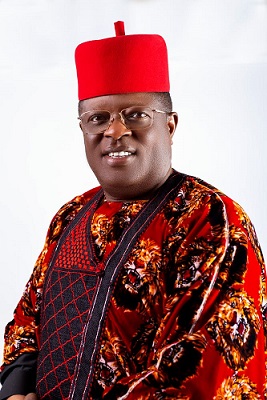
To Dr. David Umahi, assuming office as Nigeria’s minister of Works is like walking into his sitting room: he is as familiar with his new beat as he is with his living room. He will feel at home in the ministry as he does in his home. Umahi’s appointment and deployment as Works minister is one action in which President Bola Ahmed was spot on – placing a round peg in a round hole.
The core mandate of the ministry revolves around the core content of the career and profession of the civil engineer – civil construction works. The mandate of the Ministry of Works is primarily to formulate and implement the policies, programmes and projects of the Federal Government of Nigeria (FGN) with respect to Road Transport, Highways construction and rehabilitation; Highways planning and design; monitoring and maintenance of federal roads & bridges, nationwide; Provision of infrastructure as well as survey & mapping of the nation’s internal and international boundaries (Works); and Habitat and affordable housing for Nigerians (Housing).
These are the activities the new minister was engaged in all his career in the private sector and as politician and Governor of Ebonyi State.
Trained as a Civil Engineer, Umahi started his professional career immediately after completing his one-year National Youth Service Corps (NYSC). He began working for SCC Nig. Ltd., an Israeli company and a water engineering giant, as an engineer and eventually advanced to the Project Engineer position. The historic Umuahia Water Project and the Ndiegoro Aba Flood Control measures between 1988 and 1990 are a few of the projects he supervised.
Umahi co-founded Norman Engineering and Construction Nig. Limited with the then Managing Director of the National Fertilizer Company of Nigeria (NAFCON), Port-Harcourt, Dr Ombo Isokarari, and by 1993 he had become General Manager and shareholder. Before his resignation in March 2011 to pursue his political ambition as the Deputy Governor of Ebonyi State, he served as Chairman and CEO of Brass Engineering & Construction Nig Ltd, Focus Investment Nig Ltd, and Osborn La Palm Royal Resort Ltd.
As Governor of Ebonyi state, he elevated the physical infrastructure status of Abakiliki, the state capital, with modern roads and ancillary facilities. The highpoint of them all was the building of the 700-metre twin Trans-Sahara bridge which was commissioned by former President Buhari in 2017. It is one of the distinguishing landmarks of the state capital which has made Abakiliki the envy of other state capitals of its age.
David Nweze Umahi, CON, was born on July 25, 1964, native of Umunaga, Uburu in Ohaozara Local Government Area, now in Ebonyi State. Umahi received his secondary education at Ishiagu High School and Government Secondary School, Afikpo, before enrolling at Enugu State University of Science and Technology in 1982. He graduated in 1987 with a Bachelor of Science Degree in Civil Engineering.
After an illustrious career in the private sector, Umahi entered public service in 2007 as the Acting Chairman of the Ebonyi State chapter of the Peoples Democratic Party (PDP). From 2009 to 2011, he served as state chairman of the party.
In 2011, Umahi became the Deputy Governor of Ebonyi State under Governor Martin Elechi. However, in 2014, Governor Elechi supported Onyebuchi Chukwu, Minister of Health, as his successor, but Umahi insisted that his principal’s stand violated an understanding that he would take that role. Umahi went ahead to defeat Chukwu in the primaries and was elected Governor on April 12, 2015. The election was challenged by three different political parties, but in October 2015, Umahi won at the Governorship Election Tribunal. He was re-elected as Governor four years later.
On November 17, 2020, he officially defected to the All Progressives Congress (APC) and, two months later, declared his intention to run for the office of the President of Nigeria in the 2023 general elections. He later stepped down his presidential ambition to contest and win the Senatorial election for Ebonyi South Senatorial District. He vacated the Senatorial seat following his nomination and confirmation as minister.
BOSUN TIJANI – (Minister of Communication, Innovation and Digital Economy)
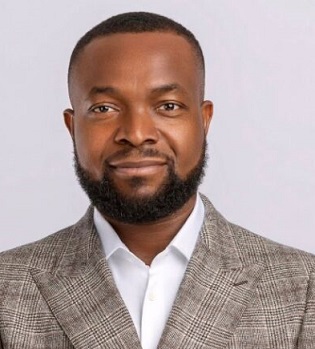
At 46, Olatunbosun Tijani is one of the young elements in the new Federal Executive Council constituted recently by President Bola Ahmed Tinubu. He represents the President’s response to the yearning of Nigerian youths for the appointment of members of their generation into key positions of responsibility in government. But, more importantly, Tijani’s appointment and deployment as Minister of Communication, Innovation and Digital Economy is another evidence of President Tinubu’s knack for appointing people to positions where they perfectly fit, based on their talent, competence and experience.
At the ministry of Communication Innovation and Digital Economy, Tijani is a round peg in a round hole. The mandate of the ministry include facilitating universal, ubiquitous and cost effective access to communications infrastructure throughout the country; Promoting the utilization of ICT in all spheres of life to optimize the communications infrastructure – digital content creation, domestic software applications and the delivery of private and public services over the internet; promoting and facilitating the development of the ICT industry and increase the contribution of the ICT industry to GDP; and utilizing ICT to drive transparency in governance and improve the quality and cost effectiveness of public service delivery in Nigeria.
Going by his antecedents, Tijani is tailor-made for the responsibilities of his new office. Basically, as minister of Communication, Innovation and Digital Economy, he would be involved in the same activities he has been engaged in over the years as an ICT entrepreneur, albeit at a higher, government policy level.
Bosun Tijani, as he is popularly known, is the co-founder of Co-Creation Hub (CcHUB), the leading Pan-African innovation and technology centre. Co-Creation Hub works at the forefront of accelerating the application of innovation and social capital for a better society.
Tijani is widely acknowledged as a pioneer and industry leader in the African technology ecosystem and was named as one of the 100 Most Influential People on the continent by New Africa Magazine. He initiated the first visit of Mark Zuckerberg to Nigeria in August 2016 as part of efforts to place Africa on the global technology map. He has also hosted other global technology leaders in Nigeria, including former Twitter CEO Jack Dorsey in 2019 and most recently in June, 2023, hosted a fireside chat with Microsoft founder and co-Chair of the Bill and Melinda Gates Foundation, Bill Gates. In 2019, under his leadership, CcHUB acquired Kenya’s iHub and launched the CcHUB Design Lab in Kigali, Rwanda in the same year. He has also expanded CcHUB’s Pan-African footprint into Southern Africa by opening CcHUB Namibia, the main tech hub in Windhoek, Namibia in 2023.
Tijani was also recently appointed as a visiting adjunct professor at the Wits School of Governance, effective September 2023 after spending time as an adjunct researcher with research interests in collaborative projects that inform practice through support to policymakers, inventors and entrepreneurs while advancing theories in innovation systems and governance.
Tijani was born in Agege, Lagos, on July 20, 1977, and spent his formative years there before moving to Abeokuta, capital of neighbouring Ogun state, for his secondary education. In 1996, he went to University of Jos, Plateau State, where he earned a diploma in Computer Science before enrolling to study Economics, graduating with a Bachelor’s degree in 2002. He later obtained an M.Sc in Information Systems and Management from the Warwick Business School, United Kingdom in 2007.
In 2023, Tijani earned a PhD in innovation and economic development from the School of Business, University of Leicester. His doctoral research focused on contributing to a better understanding of how the network perspective to innovation capacity could provide a contextually relevant framework for explaining the adoption and adaptation of innovation in developing countries. The study specifically offers an alternative path to how African countries could effectively organise their innovation ecosystems.
Tijani has also been part of the Innovation for Economic Development executive programme at Harvard Kennedy School in 2013 as well as being a 2014 Draper Hills Fellow of the Centre for Democracy, Development and the Rule of Law (CDDRL) at Stanford University.
Before CcHUB, Tijani worked with the International Trade Centre, Geneva, Switzerland as a Fellow, researching on trade development with particular emphasis on enterprise management development. During this period, he successfully led the development and deployment of a web-marketing and information services programme in Ghana between March and September 2006 and subsequently in Uganda and Kenya which recorded positive outputs. The programme was deployed in Ethiopia and later extended to South Africa and Tanzania.
At Hewlett Packard, Tijani successfully managed the deployment of the ODel learning centre at the Africa Virtual University in Kenya and completed the deployment of the HP, IEEE and University of Ibadan telecentre in Nigeria. He also initiated and completed the deployment of the HP Micro-enterprise Acceleration Programme learning centre at the Lagos Business School in Nigeria and provided recognizable support to its deployment in Egypt and Morocco.
Tijani later moved to Pera Innovation Network (PERA) in 2007 where he served as the European Innovation Manager. At PERA, he led the coordination of innovation agencies across Europe. In different capacities, he was responsible for managing the Pan-European Research Network of Universities participating in the Framework Programme 7 as well as the INNOTEX Project – a European Commission-funded project for the development of a cross cluster best practice platform for entrepreneurial innovation for the technical textile sector (United Kingdom, Spain, Estonia and Denmark).
In 2010, Tijani co-founded CcHUB, a technology innovation centre dedicated to accelerating the application of social capital and technological innovation for economic prosperity. In the early years, he led a number of social technology projects including Lagos Innovation Hotspots and the i-HQ concept (the umbrella initiative for Yaba – the fastest growing tech cluster in Africa), which involved working with MainOne Cable and the Lagos State Government to lay fibre optic cables in the Yaba area of Lagos, accelerating the growth of the area into becoming the home of technology startups in Nigeria. Under his leadership, CcHUB has driven the growth of social innovation and influenced businesses and initiatives in different sectors including – environment (Wecyclers), fiscal transparency (BudgIT), e-commerce (Traclist), Healthcare (LifeBank), education (re-learn), wellness (Truppr) and transportation (GoMyWay), civic activity (GoVOTE), online and cybersecurity (SafeOnline), among others.
His later work with CcHUB focused on the company’s expansion into other parts of Africa and positioning the business as a vital catalyst for the African tech ecosystem promoting collaboration, knowledge sharing, and the development of groundbreaking solutions to local and global challenges. This has been done in collaboration with a number of global partners and founders who have backed his work extensively.
In addition to his ongoing work with CcHUB, Tijani is also actively involved in a number of initiatives within and outside the tech ecosystem.
The young minister has served on the boards of several companies; was a member of a high level expert advisory group focused on advising the European Commission on how to mainstream research and innovation through Africa-Europe Cooperation; and was selected in 2017 by the African Leadership Institute to be a part of the prestigious Desmond Tutu Leadership Fellowship.
YUSUF TUGGAR – (Minister of Foreign Affairs)
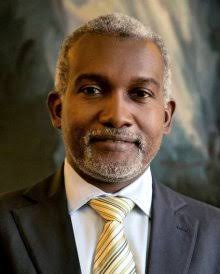
Until his appointment as Minister of Foreign Affairs in August this year, Yusuf Maitama Tuggar was the Nigerian Ambassador to Germany for five years, a position he occupied until his appointment. In a way, Tuggar’s appointment and assignment to this portfolio was like a promotion in the regular public service career – from Ambassador to Foreign Affairs Minister. It is vintage President Tinubu’s habit of placing round pegs in round holes. Tuggar will now manage Nigeria’s foreign affairs at a higher level, worldwide instead of in only one country.
In his new assignment, Tuggar is charged with overall responsibility for executing the mandate of the ministry which is to manage Nigeria’s foreign policy decision-making and implementation processes in Nigeria. He is also responsible for the external promotion of Nigeria’s domestic vision and ideal.
As Nigeria’s Ambassador to Germany, one of the biggest ambassadorial portfolios, for half a decade, Tuggar has already had substantial tutelage in the demands of his new office. He played a key role during the 23rd Session of the Conference of the Parties to the United Nations Framework Convention on Climate Change. He also facilitated the state visit of the former German Chancellor, Angela Merkel, to Nigeria in August 2018.
In March 2020, Tuggar attended a meeting held with Siemens in Germany over projects in the Nigerian power sector. Nigeria’s delegation was led by the then Chief of Staff to the then President Muhammadu Buhari, Abba Kyari, who tested positive for and later died of COVID-19. Tuggar himself tested negative but ordered the closure of the Nigerian embassy in Berlin.
As Ambassador, Tuggar initiated the repatriation of lost Benin artefacts from the German government leading to the return of 22 Benin Bronze looted artefacts valued at over 100 million pounds.
He completed his term as Ambassador to Germany on August 21, 2023 when he was sworn in as the Minister of Foreign Affairs.
The new Minister of Foreign Affairs was born on March 12,1967 in Bauchi state. He received a bachelor’s degree in international relations from the United States International University. He also attended the University of Bath, and has master’s degree from the University of Cambridge.
After graduating, Tuggar spent several years in the private sector. He was the Chief Executive Officer of Nordic Oil and Gas Services, an energy consulting firm. Tuggar was also a contributor on political and economic opinions in Nigerian newspapers and magazines.
From the oil industry in the private sector, Tuggar switched to the public sector, specifically politics. Politics flows in Yusuf Maitama Tuggar’s veins. Born into a political family in Bauchi State, his father was the Organizing Secretary of the ruling Northern People’s Congress in the period preceding and after Nigerian Independence in 1960, and later became a Senator in the Second Nigerian Republic.
Young Tuggar took the political mantle over from his father after his formal education abroad and a stint in the private sector. He served as a member of the Nigerian House of Representatives from 2007 to 2011 representing Gamawa, Bauchi state. He later contested twice for Governor of Bauchi State, both attempts terminating at the party primaries stage. He contested and won election and represented Gamawa Federal Constituency of Bauchi State in the Nigerian House of Representatives from 2007 to 2011. He served as the Chairman of the House Committee on Public Procurement, regulating government spending in the oil and gas industry, education, health and water resources. The committee worked on separating the President’s cabinet from the responsibility of awarding contracts.
He also oversaw the creation of the National Council on Public Procurement, and was the member of the House Committee that worked on Local content bill with a focus on oil and gas. He was also a member of the House Committee on foreign affairs and was the Deputy Chairman of the House Committee on Public Petitions. He sponsored a bill on inhumane transportation of livestock on the floor of the House.
In 2011, Tuggar ran for office of the Governor of Bauchi State as the candidate of the Congress for Progressive Change and came second after the election was marred with fraud and violence. In 2013, he joined the ruling All Progressives Congress (APC) on whose platform he contested the governorship primaries, coming third.
In August 2017, Tuggar was appointed the Nigerian Ambassador to Germany by President Muhammadu Buhari.
MUHAMMAD ALI PATE – (Minister of Health and Social Welfare)
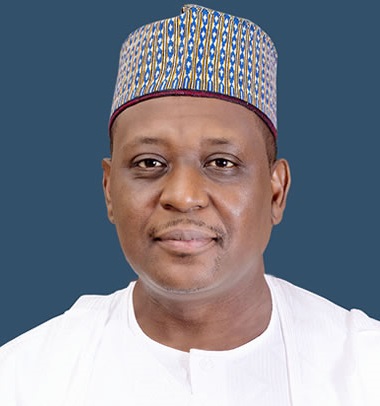
Muhammad Ali Pate has lived all his life in the medical world: as a medical student; teacher and Professor of public health; medical entrepreneur, administrator and policy maker in public and private health institutions in Nigeria and abroad. These have made him an authority in the theory, practice and administration of medicine and health.
Before he was appointed Minister of Health and Social Welfare by President Bola Ahmed Tinubu in August 2023, he had once served as Minister of State in the same ministry. Thus, his ministerial appointment was like a promotion to the pinnacle of an illustrious career in the medical world – another good example of President Tinubu’s ability to fix round pegs in round holes.
Professor Pate’s health ministry has responsibility for monitoring and evaluation of programmes, projects and plans implementation in Nigeria’s health sector. It serves as secretariat to the National Council on Health and conducts research into the sectors over which the ministry has jurisdiction in collaboration with other departments and agencies, institutions and parastatals.
The new minister who is a Professor of the Practice of Public Health Leadership in the Department of Global Health and Population at Harvard University has already hit the ground running as he is back on a familiar turf.
Muhammad Ali Pate was born on September 6, 1968 in Misau Local Government Area of Bauchi State. He was the first in his family to complete a secondary school education.
Pate graduated from high school and proceeded to Ahmadu Bello University (ABU) Medical School in Kaduna State. Upon graduation from ABU, he moved to Gambia where he worked in rural hospitals for a few years. He was then a fellow in infectious diseases at the University of Rochester Medical Center in the United States. He is an American Board-Certified MD in both Internal Medicine and Infectious Diseases, with an MBA (Health Sector Concentration) from Duke University, USA. Prior to this, he had studied at the University College, London. He also has a Masters in Health System Management from the London School of Hygiene & Tropical Medicine, UK.
Pate had an extensive career spanning over 10 years at the World Bank in Washington DC and held several senior positions including Senior Health Specialist and Human Development Sector Coordinator for the East Asia/Pacific Region and Senior Health Specialist for the African Region. At the World Bank Group, he served as the Global Director for Health, Nutrition and Population, and Director of the Global Financing Facility for Women, Children and Adolescents (GFF). While at the World Bank, a major project led by Pate was the far-reaching health sector reform programmes in Africa, East Asia and other regions of the World Bank. Of note is his initiation of landmark Public Private Partnership to replace a National Referral Hospital in Lesotho, Africa.
Back in Nigeria, Pate was appointed as Executive Director of the National Primary Health Care Development Agency (NPHCDA) in 2008. His commendable role in that position paved the way for his appointment as Minister of State for Health by President Goodluck Jonathan. He, however, resigned on July 24, 2013 to take up the position of Professor in Duke University’s Global Health Institute, USA. While in that institution, he served as the Chief Executive Officer of Big Win Philanthropy and an adjunct Professor of Global Health.
In 2021, Pate returned to Harvard University as a Julio Frenk Professor of the Practice of Public Health Leadership at the Harvard T.H. Chan School of Public Health. Two years later, he was appointed Chief Executive Officer of GAVI, the Vaccine Alliance, which works to provide vaccines in low-income countries.
Back again in Nigeria, Pate contested the Bauchi State Governorship election as the candidate of Peoples Redemption Party (PRP) in Bauchi State, after losing his bid for the ticket under the ruling All Progressives Congress (APC).
Pate is a recepient of the National Honour of the Commander of the Order of the Niger (CON).
MOHAMMED IDRIS MALAGI – (Minister of Information and National Orientation)
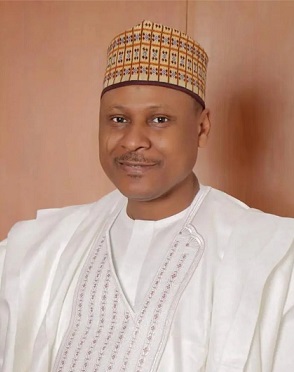
One of the best testimonials any new minister would wish to receive on assumption of office was the one issued to Mohammed Idris Malagi, Minister of Information and National Orientation.
Writing in The Whisperer, an online publication, on August 26, 2023, Farooq A. Perogi, one of Nigeria’s best opinion writers at the moment, said: “I have known Malagi since the late 1990s when I worked for the Weekly Trust. He is by far the best credentialed minister of information that Nigeria has had in recent memory.”
Perogi was reacting to what he described as Malagi’s “refreshing and applaudable departure from the primitive information management strategies of their predecessors.” Specifically, Perogi, the Nigerian-American professor, author, media scholar, newspaper columnist, blogger and activist, was touched by Malagi’s statement upon assumption of office, that ‘the era of relying on propaganda to propagate government programmes is now over.’ “This is music to the ears…,” Perogi said.
This is an eloquent testament to the fact that, in appointing and deploying Malagi as Minister of Information and National Orientation, President Bola Ahmed Tinubu has planted a round peg in a round hole.
The core mandate of the ministry is the “management of the image, reputation and promotion of the culture of the people and government of Nigeria through a dynamic public information system that facilitates access by citizens and the global community to credible and timely information.”
Malagi’s antecedents have adequately prepared him for the challenges of the assignment. After teaching at a college of education for years, he went into public relations, advertising, marketing, and finally publishing. Apart from being the publisher of the Abuja-based Blueprint newspaper, he is also the proprietor of WE 106.5 FM Abuja, was general secretary of the Newspaper Proprietors’ Association of Nigeria (NPAN) and has been a major player in the Nigerian Institute of Public Relations (NIPR).
Mohammed Idris Malagi was born on May 2, 1966 in Gbako local government area of Niger State. He had his primary education in Kontagora between 1971 and 1977. He then proceeded to GSS Rijau in 1977 and graduated in 1982. In 1983 he was admitted to study English Studies at the Usmanu Danfodiyo University, where he graduated in 1987. He had his Master’s degree in the same discipline from the Bayero University Kano in 1995.
In May 2011, Malagi founded the Blueprint newspaper and has been the chairman and CEO since then. He is also the founder and chairman of Bifocal Group. He took over ownership of Kings Broadcasting Network, owners of WE 106.5 FM, Abuja, on November 27, 2019, and in December 2020, he was elected General Secretary of Newspaper Proprietors’ Association of Nigeria.
He served as Communications Consultant on the Promotion of Nomadic Education in Northern Nigeria to the Federal Ministry of Agriculture and Rural Development from 2007 to 2009.
Malagi led the committee that developed and implemented Training Guide for Tertiary Education Trust Fund (TETFUND) across Nigeria from 2009 to 2011.
The media guru was appointed as Communications Consultant by the Independent National Electoral Commission (INEC) from 2017 to 2021.
The new minister facilitated the design and implementation of Strategic Communications Guidelines for the Federal Ministry of Humanitarian Affairs, Disaster Management and Social Development from 2019-2022.
Malagi, as a member of the All Progressives Congress (APC) was a governorship aspirant in Niger State for the 2023 Nigerian general election. He lost to House of Representatives member, Umar Bago. He was appointed the Director of Strategic Communications for the Asiwaju Bola Ahmed Tinubu Presidential Campaign Council (PCC).
Malagi is the founder of Mohammed Idris Malagi Foundation and holder of the traditional title of Kakaaki Nupe, a title bestowed on him by Yahaya Abubakar, the Etsu Nupe. The title was in recognition of his philanthropy and personal accomplishments in the media and public relations space. On December 8, 2022, he was awarded the Milestone Recognition Media Icons in Nigeria award by the Nigeria Union of Journalists.
LATEEF FAGBEMI – (Minister of Justice and Attorney General of the Federation)
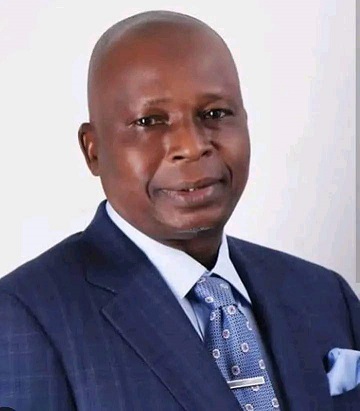
Until his appointment and deployment as the 24th Attorney General of the Federation and Minister of Justice in August, Prince Lateef Olasunkanmi Fagbemi, SAN, was the Lead Counsel of the 2023 All Progressives Congress (APC)’s Presidential Election Petition Legal Team.
Those who are not familiar with his antecedents and pedigree would see his appointment as politically motivated and reward for loyalty and legal service to APC. But that is very far from the truth. His emergence is a palpable demonstration of the mantra of putting a round peg in a round hole. Like many of Tinubu’s other ministers, the appointment of the iconic prince from Ijagbo town in Kwara State is faultless, both in terms of superlative qualifications he wields and his enviable personal attributes. Fagbemi’s sheer brilliance, deep knowledge of the law, experience in jurisprudence and courage to tell the truth to power easily commended for the position of Nigeria’s number one legal officer.
He was one time the youngest Senior Advocate of Nigeria, having attained the prestigious and enviable rank at the youthful age of 37! This means he got that enviable rank of distinction before his 11th year at the bar, having been called to the Bar in August 1985. For the past four decades, Fagbemi, now 64, has handled numerous cases in diverse areas of law practice including arbitration, alternative dispute resolution, commercial law, land and border disputes, high-profile political cases, anti-corruption matters, constitutional matters and election petition cases.
He was never afraid to speak truth to power. For example, during the heat of scandals involving the former Secretary to the Government of the Federation, Mr. Babachir Lawal, and the ex-chairman of the Pension Reform Task Team, AbdurRasheed Maina, Fagbemi said: “Truth be told, every well-meaning Nigerian must commend the effort of the present government at combating corruption in the country. That said however, the case of Maina and that of Babachir Lawal, I sincerely think, ought to have been handled differently.
“I expected the government to have come out with a definite position on its suspended SGF, having received the report of the committee purposely set up to look into the allegations against him.
“The time it took the government to take a position in Babachir Lawal’s case makes the Nigerian people to have doubt about the sincerity of the government in the fight against corruption”
“The Maina case epitomizes the problem inherent in our public administration and our system generally. Taking the matter away from the mischievous realm of politics, one cannot stop wondering how somebody who had long been declared wanted by the EFCC, the most popular crime-fighting organisation in Nigeria, would be right there within the corridors of power and nobody was able to blow the whistle on him.”
These are just a few of the reasons why Fagbemi’s appointment has been widely acclaimed, given the fact that it is the function of the Attorney-General to advise the Government on the constitutionality of policies and actions taken or embarked upon by the Government. This is in addition to providing legal services to support law enforcement agencies and every department or institution of government. A lot of issues on rule of law and constitutionality in the country also rests on the office of the AGF.
Prince Fagbemi was born on July 16, 1959 in Ijagbo, Oyun Local Government Area of Kwara State. He acquired his Bachelor of Law degree (LL.B.) from the University of Jos in 1984. He was called to the Nigerian Bar in 1985 and acquired his Master of Laws degree (LL.M.) from the Obafemi Awolowo University in 1987. He became a senior advocate of Nigeria in 1998.
Prince Fagbemi acquired his initial tutelage, grilling and professional maturation in the chambers of the legal guru, Chief Afe Babalola, SAN, within eleven years. He then proceeded to establish his own chambers, Lateef Fagbemi & Co, aka, Temitope Chambers. Since then, there has been no looking back. The chamber has since grown in leaps and bounds, with branches in Ibadan Lagos, Kwara, and Abuja.
Before serving as APC’s team’s Leading Counsel in the 2023 presidential election Tribunal, he was the counsel to the APC during Governor Oyetola versus Adeleke’s election tribunal hearing appeal. He was also the legal counsel to Former Governor of Abia State, Orji Kalu, who is being prosecuted by the EFCC for financial crimes.
AHMED MUSA DANGIWA – (Minister of Housing and Urban development)
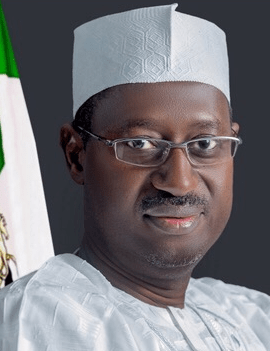
Ahmed Musa Dangiwa is a quintessential professional who has devoted virtually all his adult life to the service of housing development. Trained as an Architect, Dangiwa has over 30 years working experience in real estate and infrastructure development, mortgage banking, financing and management in both the private and public sector.
Appointed and deployed as the Minister of Housing and Urban development, Dangiwa is unarguably one of the round pegs in round holes in President Bola Ahmed Tinubu’s cabinet.
In the new ministry just carved out of the erstwhile Ministry of Works and Housing, Dangiwa has responsibility for policy formulation and implementation in respect of habitat and provision of affordable housing for Nigerians as well as urban planning and renewal.
His training and career antecedents in the housing industry have adequately prepared him for the new assignment. He holds a Bachelor’s degree in architecture and Master’s in architecture and MBA, all from Ahmadu Bello University, Zaria. He is also an Alumnus of the prestigious Wharton School of Business at the University of Pennsylvania, United States.
Dangiwa began his working career at TRIAD Associates and later as Managing Partner of AM Design Consults, an architectural and real estate development consultancy firm; as well as the Jarlo International Nig. Limited, a construction company. He excelled as a mortgage finance practitioner, rising through the ranks in Sahel Mortgage Finance Limited from Property Manager to Head of Credit Control to becoming the Manager, Mortgage Banking Division.
His career climaxed with his appointment as Managing Director/Chief Executive Officer (CEO) of Federal Mortgage Bank of Nigeria (FMBN) where he made a big difference. When Dangiwa assumed the leadership of the bank, only N232 billion had accrued to the National Housing Fund (NHF) scheme in over 25 years at about 9.28 billion per annum. He led his team to mobilize N279 billion in additional contribution to the NHF scheme at an average of N55.8 billion per annum.
The bank also achieved a record disbursement of 175 billion affordable housing loan and construction finance; provision of NHF mortgage loan to 5,938 beneficiaries; and provision of home renovation loan to 77,575.
It also attained a historic increase in processing of N39.5 billion in refunds to 247,521 retired NHF contributors; initiated and kickstarted the N40billion FMBN cities project; commenced the historic drive to enhance affordability of FMBN Housing products for the ordinary Nigeria.
Dangiwa is a member of many professional bodies: a senior associate member of Risk Managers Associate of Nigeria (RIMAN); a fellow of the Institute of Credit Administration (FICA) and Institute of Strategic Customer Service and Trade Management (ICSTM); an Honorary Fellow of Chartered Institute of Loan and Risk Management of Nigeria (CILRM); and an Honorary Senior Member of Chartered Institute of Bankers of Nigeria (CIBN).
In acknowledgement of his services, Dangiwa has been accorded many awards, honours and recognitions. Some of them include: Award of Excellence by Kankia Transformation Forum Katsina State; Real Estate Personally of the Year 2018; Certificate of Service as a member of Governing Council Award; Public Service Officer of the Year award 2018; ICEN Prestigious Award for the year 2018; Housing Development Advocacy Network & Housing TV Africa; Champion of empowerment & Disability Inclusion In Nigeria; ICON of Housing Development and Environment Management Merit Award; Mortgage Banker of the Year award; and Presidential Award for Vocational service 2021.
TAHIR MAMMAN – (Minister of Education)
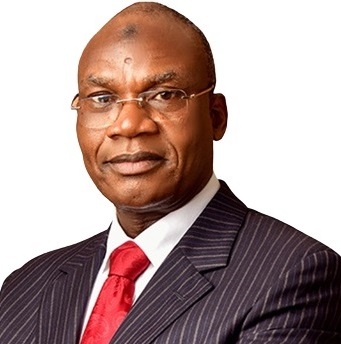
Tahir Mamman is a lawyer and educationist who has risen to the peak of both legal and teaching professions. He became the Director-general of the Nigeria Law School, the apex institution for legal education in Nigeria, as well as the Vice-Chancellor of Baze University, a conventional university based in Abuja. For his excellence in the two professions, he earned the prestigious professional ranks of the Senior Advocate of Nigeria, SAN, and Professor of law.
Mamman’s appointment and deployment as Minister of Education is another good example of President Bola Tinubu’s ability to put round pegs in round holes. The minister’s responsibility at the new duty post is to lead the ministry in the discharge of its functions which include: formulating a national policy on education; collecting and collating data for purposes of educational planning and financing; maintaining uniform standards of education throughout the country; and controlling the quality of education in the country.
Others are: harmonizing educational policies and procedures of all the states of the federation through the instrumentality of the National Council on Education; effecting co-operation in educational matters on an international scale; and developing curricula and syllabuses at the national level in conjunction with other bodies.
For someone who has had an illustrious career spanning all the levels of Nigeria’s educational system, Professor Mamman no longer has to learn the ropes on his new assignment.
Mamman was born in 1954 at Michika in Adamawa State. He holds an LL.B degree from the Ahmadu Bello University in 1983 and was called to the bar in the Nigerian Law School in 1984. He earned his Master’s degree from the University of Warwick, England, in 1987 and his PhD in 1990 from the University of Warwick, Warwickshire, England.
He began his working career with the Adamawa State Judiciary before witching over to teaching at the University of Maiduguri as a lecturer in the Faculty of Law. He rose to become Head of Department of Common Law and Dean of the faculty. He was appointed member of the National Universities Commission and member of Local Government Election Tribunal, Adamawa State in 1997. He was the Dean of Students Affairs in University of Maiduguri from 1997 to 2000 and Adviser/part-time consultant in the State House of Assembly of Adamawa, Yobe and Borno States from 1999 to 2000. He was also Steering Committee member for the establishment of Adamawa State University; external examiner at the Ahmadu Bello University from 2001 to 2002 and patron for Youth Federation of Nigeria and Nigeria Youth Organization of University of Maiduguri. He became the Deputy Director of Nigeria Law School, Kano Campus, from 2001 to 2005 before his appointment as the Director General of the institution.
Professor Mamman joined party politics in 2014 after completing his tenure as Director-General of The Nigeria Law School. He ran for Adamawa state Governorship election on the platform of the All Progressives Congress (APC) in December 2014 along with three other aspirants. In June 2020 the pary’s National Executive Committee appointed and inaugurated him as a member representing the North-East geopolitical zone as the Acting National Vice Chairman in the National Caretaker/Extraordinary Convention Planning Committee (CECPC) of APC.
He is a member of the Body of Benchers, Council of Legal Education, Nigerian Bar Association, Nigerian Association of Law Teachers, Commonwealth Legal Education Association, Centre for Computer- Assisted Legal Instruction, USA; and National Association of Vice Chancellors of Nigeria. He is also a member of the United Kingdom Centre for Legal Education; African Network of Constitutional Lawyers; International Bar Association; Body of Senior Advocates of Nigeria (BOSAN); and Governing Board of International Association of Law School, Washington DC.
He holds the chieftaincy title of Dan Ruwata Adamawa Emirate and Dokajin Mubi of Adamawa state. In recognition of his contributions to the development of the country, the Federal Government of Nigeria bestowed on him the national honour of Officer of the Order of the Niger (OON).




